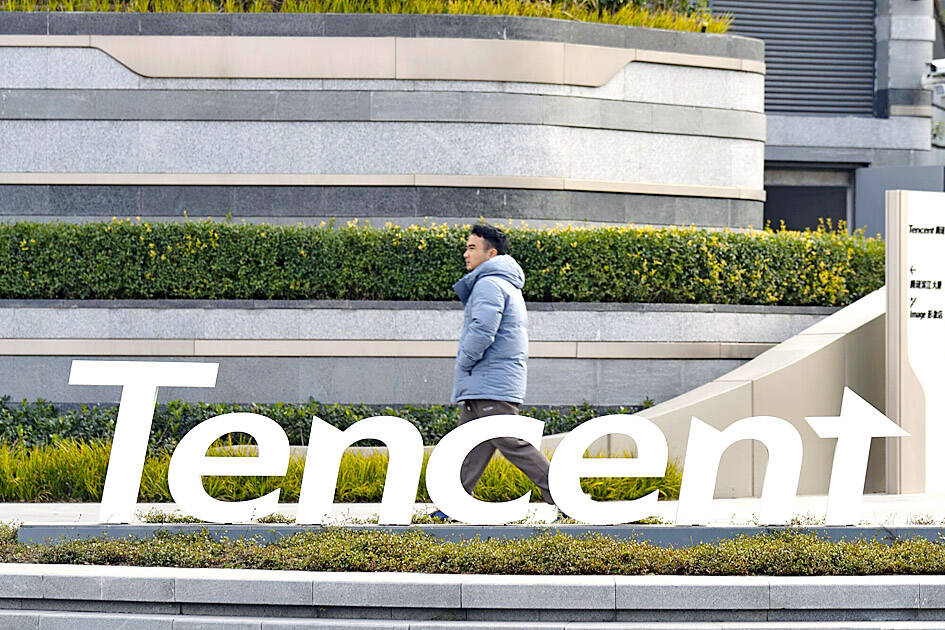The US Department of Defense has added Chinese technology giant Tencent Holdings Ltd (騰訊) and battery manufacturer Contemporary Amperex Technology Co Ltd (CATL, 寧德時代新) to a list of companies it says are affiliated with Beijing’s military.
Tencent shares yesterday plummeted more than 7 percent in Hong Kong, while CATL briefly sank more than 5 percent in Shenzhen before paring the losses.
The two firms were included on a list of Chinese military companies operating in the US that was due to be published yesterday on the US Federal Register, with copies available for download the day before.

Photo: Bloomberg
Tencent is one of the top players in China’s expansive technology sector, operating the WeChat (微信) “super app,” with other offerings across gaming, content streaming and cloud services.
CATL is also a major firm, producing more than one-third of the electric vehicle batteries sold in the world.
They have been used in models from a long line of foreign manufacturers, including Mercedes-Benz AG, BMW AG, Volkswagen AG, Toyota Motor Corp, Honda Motor Co and Hyundai Motor Group.
Tencent said that it intends to engage in discussions with US authorities as part of a process “to correct this mistake.”
The company would “undertake legal proceedings” if necessary to remove itself from the list, it said in a statement published yesterday on the Hong Kong Stock Exchange Web site.
CATL also said its inclusion on the list was a “mistake” and the company is “not engaged in any military related activities.”
“We welcome responsible discourse on our business operations and take questions about our business seriously,” it said in a statement.
The National Defense Authorization Act for Fiscal Year 2021 required the US secretary of defense to identify Chinese military companies operating directly or indirectly in the US and submit a list to the US Congress, with the unclassified portion of the list to be published on the US Federal Register.
The list does not have direct legal implications for the companies in question, but can affect their reputations, and listed firms have sued over their inclusion in the past.
The US considers China its primary rival, and Washington has for years rolled out measures targeting technology companies over national security concerns and fears that technology could be used by Beijing for military purposes.
Beijing yesterday criticized Washington’s latest move as “unreasonable suppression of Chinese enterprises,” and urged the US to “immediately correct its wrong practices.”
“China is always firmly opposed to the US side’s generalization of the concept of national security,” Chinese Ministry of Foreign Affairs spokesman Guo Jiakun (郭嘉昆) said at a regular news conference.

The US dollar was trading at NT$29.7 at 10am today on the Taipei Foreign Exchange, as the New Taiwan dollar gained NT$1.364 from the previous close last week. The NT dollar continued to rise today, after surging 3.07 percent on Friday. After opening at NT$30.91, the NT dollar gained more than NT$1 in just 15 minutes, briefly passing the NT$30 mark. Before the US Department of the Treasury's semi-annual currency report came out, expectations that the NT dollar would keep rising were already building. The NT dollar on Friday closed at NT$31.064, up by NT$0.953 — a 3.07 percent single-day gain. Today,

‘SHORT TERM’: The local currency would likely remain strong in the near term, driven by anticipated US trade pressure, capital inflows and expectations of a US Fed rate cut The US dollar is expected to fall below NT$30 in the near term, as traders anticipate increased pressure from Washington for Taiwan to allow the New Taiwan dollar to appreciate, Cathay United Bank (國泰世華銀行) chief economist Lin Chi-chao (林啟超) said. Following a sharp drop in the greenback against the NT dollar on Friday, Lin told the Central News Agency that the local currency is likely to remain strong in the short term, driven in part by market psychology surrounding anticipated US policy pressure. On Friday, the US dollar fell NT$0.953, or 3.07 percent, closing at NT$31.064 — its lowest level since Jan.

The New Taiwan dollar and Taiwanese stocks surged on signs that trade tensions between the world’s top two economies might start easing and as US tech earnings boosted the outlook of the nation’s semiconductor exports. The NT dollar strengthened as much as 3.8 percent versus the US dollar to 30.815, the biggest intraday gain since January 2011, closing at NT$31.064. The benchmark TAIEX jumped 2.73 percent to outperform the region’s equity gauges. Outlook for global trade improved after China said it is assessing possible trade talks with the US, providing a boost for the nation’s currency and shares. As the NT dollar

The Financial Supervisory Commission (FSC) yesterday met with some of the nation’s largest insurance companies as a skyrocketing New Taiwan dollar piles pressure on their hundreds of billions of dollars in US bond investments. The commission has asked some life insurance firms, among the biggest Asian holders of US debt, to discuss how the rapidly strengthening NT dollar has impacted their operations, people familiar with the matter said. The meeting took place as the NT dollar jumped as much as 5 percent yesterday, its biggest intraday gain in more than three decades. The local currency surged as exporters rushed to